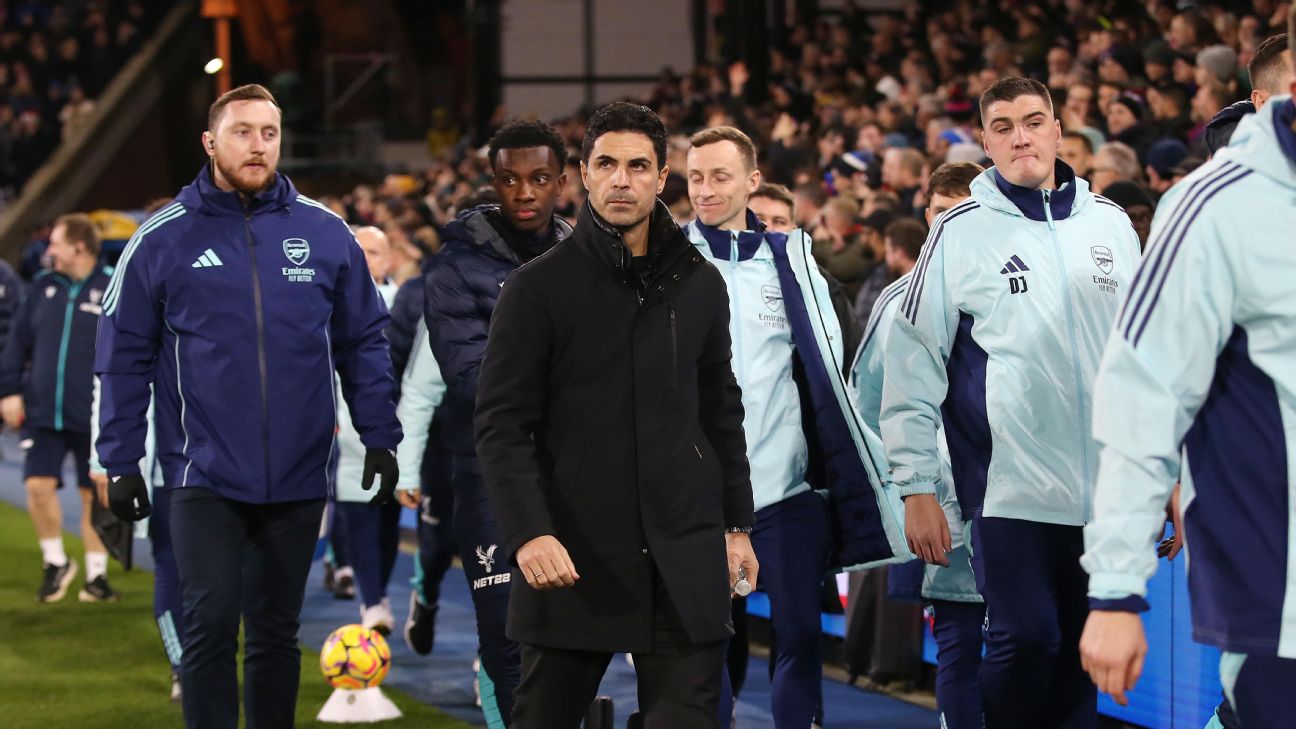Soccer will never be solved in the same way that baseball and, to a lesser extent, basketball were.
Baseball teams got so good at figuring out what actually leads to winning — strikeouts, walks, home runs — and then aggressively ignored everything else, targeting those areas through better player identification and player development. In fact, they got too good.
The “Moneyball” revolution made the sport much worse to watch because games took forever and the ball was rarely ever in play. Things got so bad that Theo Epstein — the executive who built the curse-breaking Boston Red Sox and Chicago Cubs teams and, along with Billy Beane, was one of the faces of the sport’s head-first dive into analytical decision-making — was eventually hired by Major League Baseball to figure out what rules to change and save the sport that he and others accidentally might have destroyed.
In basketball, it’s a simpler story: Three points is worth more than two. Twenty years ago, the average NBA team attempted 14.9 3-pointers per game. Last season, the average NBA team attempted 35 per game.
Soccer should be mostly immune to this for a number of reasons, but mainly: There are barely any goals, and each game is a dynamic, free-flowing mess immune to pre-planned movements and in-game coaching. And since there are so few goals, the first goal in every game is insanely valuable — it drastically shifts the incentives of both teams in a way that’s just not true in either baseball or basketball.
The team that scores first in a soccer game wins about 2.3 points on average — that’s not too far off the full three points from winning a soccer game, and that rate would come out to about 87 points per Premier League season, or just about the same rate as Manchester City over the past five seasons. So, if you were going to try to solve soccer, you’d try to find a moment in the game when you can draw up a play. And you’d want that moment to be as early in the game as possible — before the other team gets a chance to score the first goal themselves.
In other words, you’d want to do exactly what one Premier League team has done, four weeks in a row.
Have Brentford discovered soccer’s cheat code? What does it say about everyone else in the Premier League, and should other teams be following Brentford’s lead?
How Brentford solved the first minute — and why others teams can, too
First, they did it against Manchester City, at the Etihad:
We know Tottenham head coach Ange Postecoglou doesn’t think Spurs need a set-piece coach, so perhaps it made sense that the same thing happened to them too:
But then, West Ham somehow also didn’t see it coming:
And now we must give some credit to Wolves manager Gary O’Neill. Yes, his team has one point and the worst goal differential in the league through seven games, but Wolves were able to keep Brentford off the scoresheet for a whole 75 seconds:
Not satisfied with waiting more than a minute after the opening kickoff to score a goal, Brentford then scored 32 seconds after their own kickoff — to go up 3-2, midway through the first half:
Brentford scored within 40 seconds against Man City, Tottenham, and West Ham. The Bees are the first Premier League team to score within the opening minute in three straight games, and they’re only the second Premier League team to score three goals within the opening minute … in an entire season. As to why it took them so long to score against Wolves, manager Thomas Frank provided some rare insight into his club’s methods.
“We have been practicing coin tosses the whole week and [Christian] Norgaard didn’t do well enough,” he said. “That’s why it took a little bit longer.”
OK, what the heck is happening here?
The most important point: Brentford are trying to score on these plays. Here’s how they lined up for the kickoff against Man City:
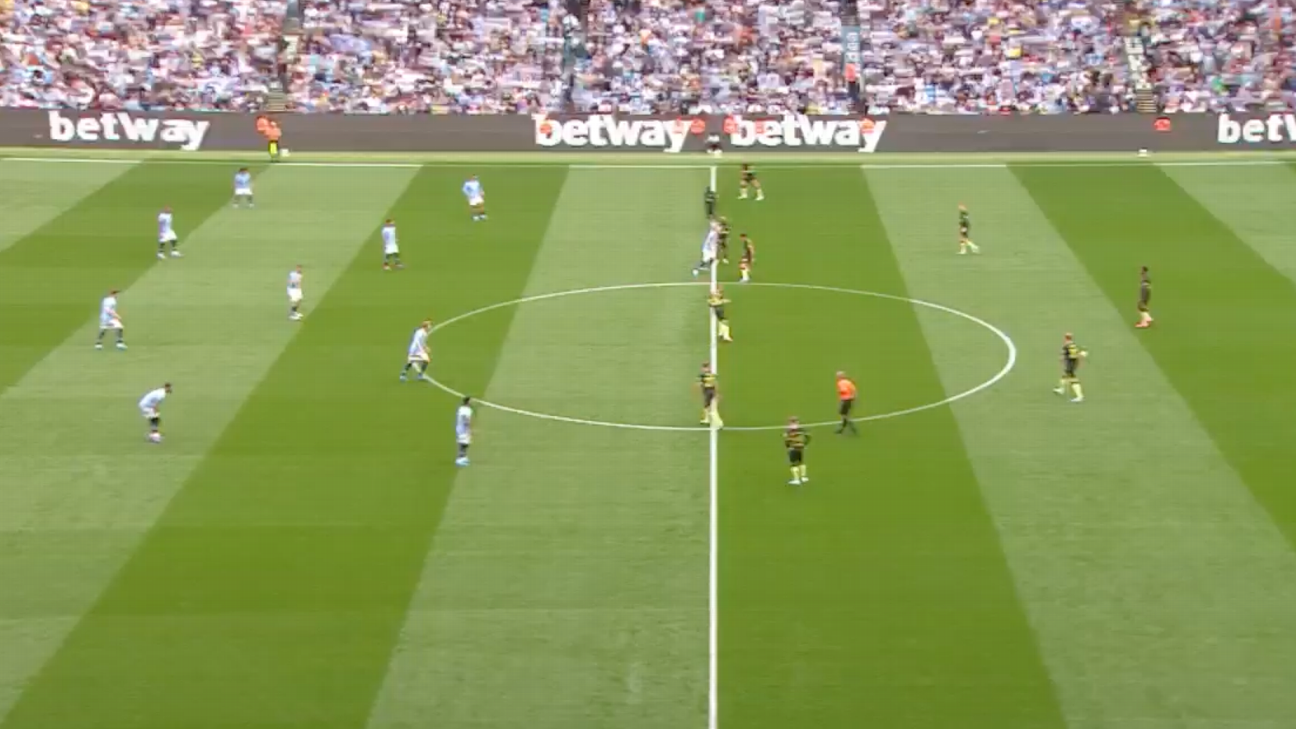
And here’s how it looked against Spurs. (The 11th Brentford player is below the bottom of the screen.)
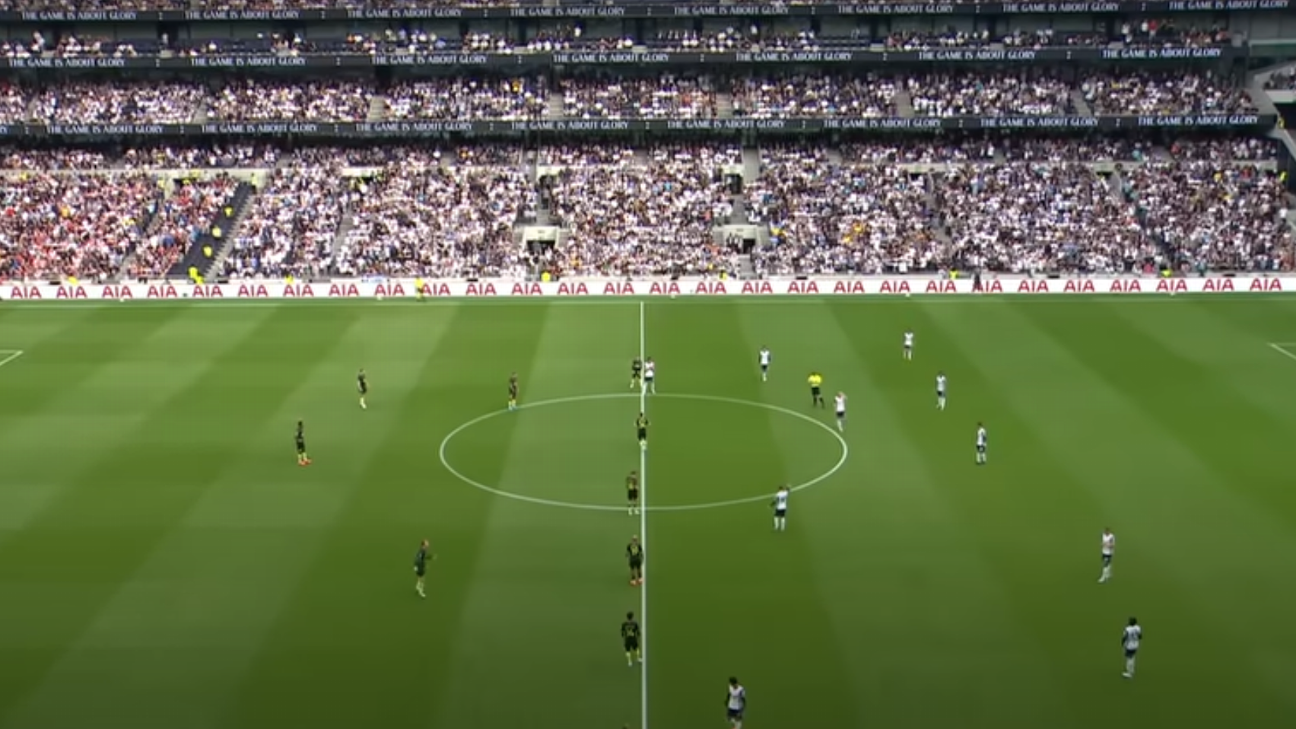
Pretty much the same structures, not a single outfield player more than a few yards below the center circle, seven men lined up across the midfield line, and four of them bunched toward the right side. Man City are in their base defensive structure (4-3-3) and have just slightly shifted everyone over to the left. Spurs, meanwhile, have dropped midfielder Rodrigo Bentancur into the backline to temporarily create a back five.
The striking thing about both of these images is how both City and Spurs are defending these plays as if they’re normal soccer plays. They’re in traditionally recognized soccer shapes, with minor adjustments to deal with Brentford’s overload to one side. But both City and Spurs still have half of their players covering a side of the field where there are almost no Brentford players. This is like an NFL team watching multiple receivers go in motion to the opposite side of the field, only for none of the defensive backs to follow them, instead opting to defend the empty space.
Perhaps aware of a potential opponent adjustment, Brentford switched to a more symmetrical shape before the West Ham match:
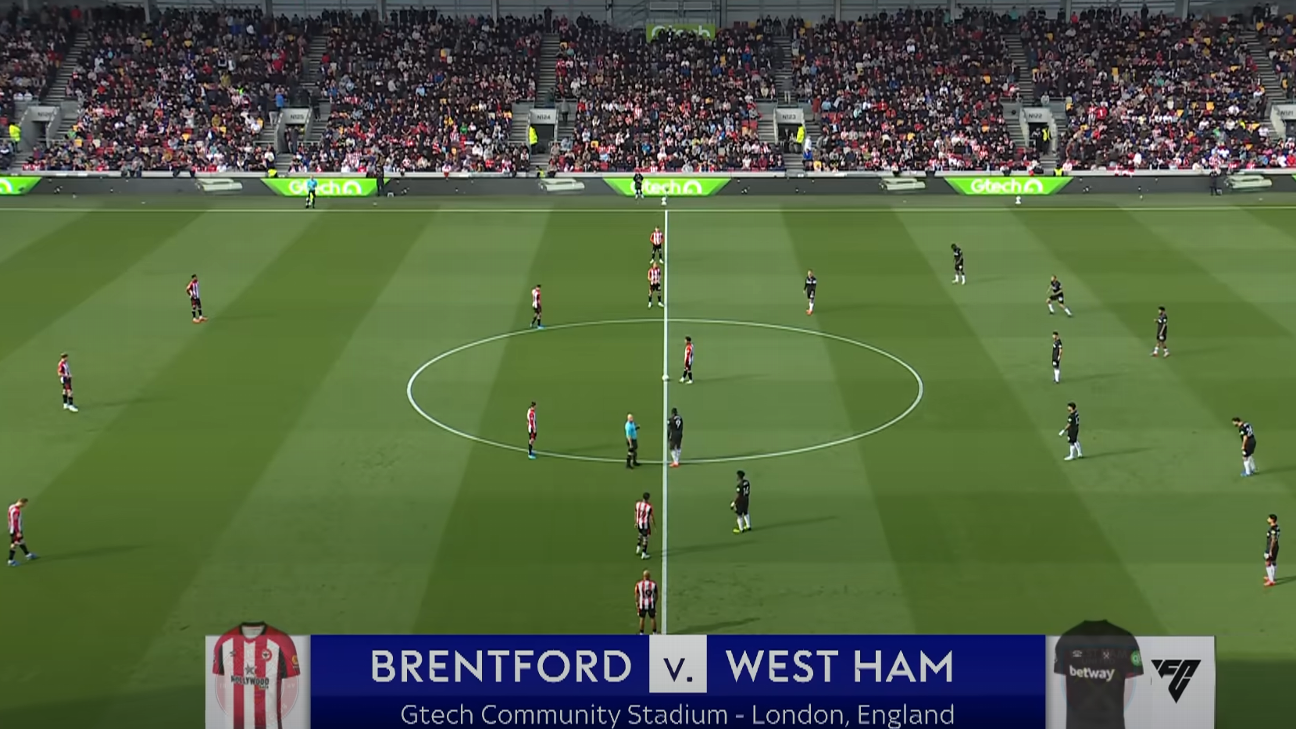
In the first two matches, Brentford play the ball back to goalkeeper Mark Flekken, who then hits a long ball up to the overloaded side of the field. Against West Ham, though, Brentford hold on to the ball a bit longer and shuffle it between their center backs, and that gives all of their advanced players more time to get up the field and converge in the center, a few yards before the penalty area. Ethan Pinnock eventually hits a long ball into that space, they win the second ball and they ultimately score.
Now, this wouldn’t be as big of a story if Brentford didn’t, you know, score these goals. Per Stats Perform’s expected-goal model, the three kickoff goals were worth a combined 0.54 xG. They’re probably fortunate to score even one, let alone three. But goals or not, Brentford are a massive outlier in terms of how they approach the kickoff.
Stats Perform’s expected-possession value model looks at everything that happens with the ball on the field and using historical data, it determines how much each action increases or decreases a team’s chances of scoring a goal within the next 10 seconds. In other words, it’s a measure of who and what is moving the ball into dangerous areas.
A failed pass into the opposition box will still likely generate positive value, while the opposite would happen from a long pass backward. Across the first 90 seconds of seven games this season, Brentford have created nearly a full goal of possession value. No one else in the league is anywhere close:
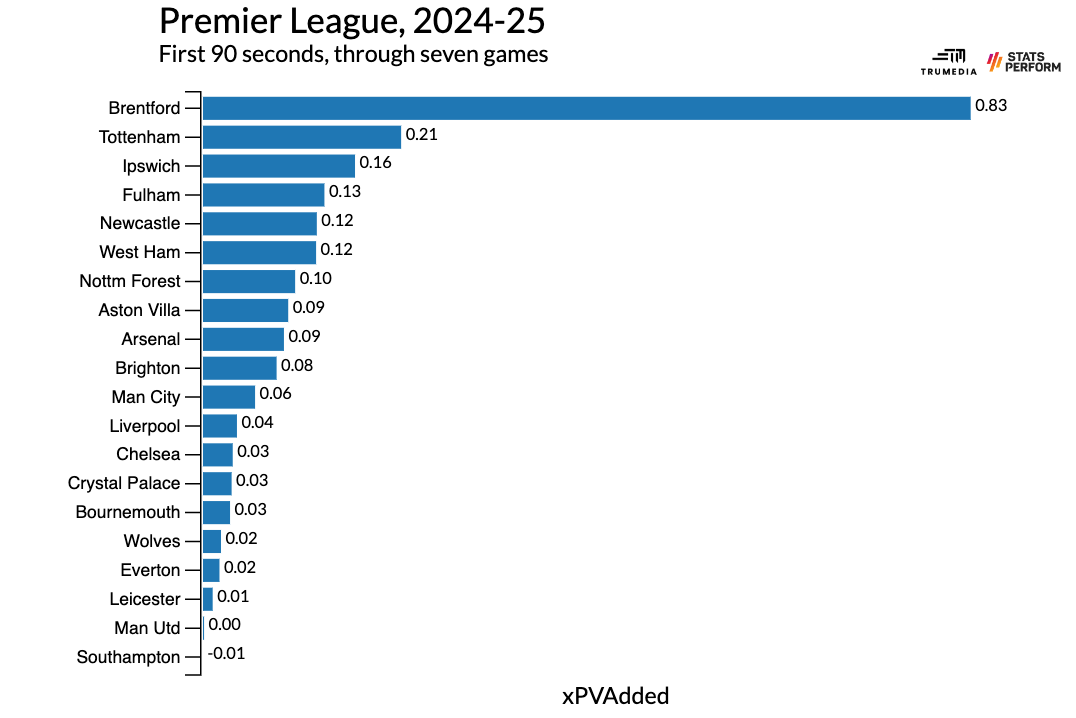
There’s also reason to believe that models are missing something and Brentford are actually much more dangerous than any historical algorithm could ever pick up on. Goals are simply way less likely to be scored in the first five minutes than at any other point in a game. Various studies have found this, and while I don’t have more granular info, since 2009 in the Premier League, there were 0.1 goals scored per game in the first 15 minutes, but then double that rate for any other 15-minute increment.
It appears that teams don’t approach the start of matches in the same way that they do the rest of matches. In fact, there’s some evidence, discovered by analyst Michael Caley, that they do actually “have a go” after 10 minutes. The goal-scoring trend line briefly shoots up after the 10-minute mark before returning to average.
And so, if the first 10 minutes are almost a kind of unspoken feeling-out process for both sides — Lionel Messi famously just walks around for the first 10 minutes of matches before he decides how he’s going to win the game — then there would be an added advantage to a team like Brentford coming out swinging right from the jump.
That would mean that there’s a two-part asymmetrical advantage for Brentford. They clearly put more time into planning out the beginning of matches. See the level of detail across the City, Spurs, and West Ham games, and then compare it to the lack of creativity from any of the defending teams. Brentford are essentially running NFL-style passing patterns, and their opponents are defending the movements as if they’re passing the ball sideways in possession like a normal soccer team. Plus, Brentford are able to practice these moments. And so their players aren’t just executing these pre-planned patterns — they’re also comfortable dealing with the chaos from the second balls, and then they also have an idea of what to do once they regain possession in the attacking third.
I can’t guarantee it, but I would be willing to bet a lot of money that almost no other Premier League team is spending any training time on defending these kickoff situations. So, Brentford have a better plan than everyone else, and then their players are better prepared to execute than everyone else.
That’s how you score from a kickoff, four games in a row.
Why isn’t anyone else in the Premier League doing this?
Throughout the history of the sport, there have been arguments about the right way to play: do you want the ball, or do you want the other team to have the ball? Do you focus on results at all costs or is there some higher aesthetic mandate that, if achieved, will ultimately lead to great results anyway?
The funny thing about these kickoffs, though, is that there really is no argument against them. It is the right way to approach this moment of the match. The worst outcome is that your opponent wins possession deep in their own half. Unsurprisingly, the club owned by the former professional sports bettor, Matthew Benham, perhaps the most analytically inclined team in the world, are the ones who seem to have figured it out. Brentford won’t keep scoring in the first 90 seconds of every game, but there’s no denying that they’re creating more value and, more importantly, giving themselves a better chance to win games by doing this.
If we look at expected goals created in the first 90 seconds of games, the chart is even more lopsided than the one above:
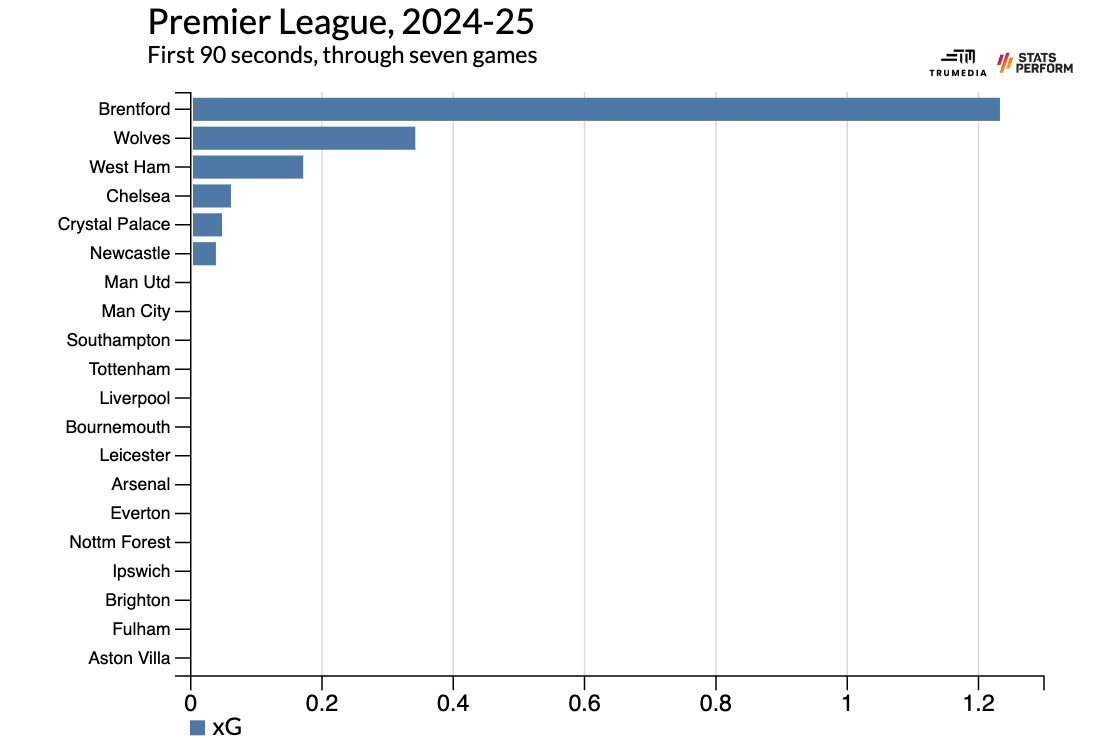
The average team has created 0.1 xG in the first 90 seconds of their games through seven matches. Brentford are more than a full goal ahead of that. Across a full season, that would be about six goals more than the average team. And when you consider that a goal is roughly equivalent to one point, so they’d be gaining six points on the field. Given how detail oriented and obsessive most Premier League managers are, isn’t it kind of mind-boggling that no one else is doing this? What coach wouldn’t kill for an extra two wins per season? Apparently, almost all of them.
There’s no reason why Liverpool, or Arsenal couldn’t also be doing this or couldn’t have done it in the past. Had they been, they both might have a few more league titles than the one combined over the past 20 seasons.
Now, it’s a little unfair to single either of them out. Liverpool are the only big club who have used data as a main piece in their scouting process, and it helped totally transform the club. They also used to be the leaders in exploiting set pieces, a mantle that has since been taken up by Arsenal. Mikel Arteta’s set-piece coach at Arsenal, Nicolas Jover, got his first Premier League job from Brentford.
Set plays have become increasingly important across Europe — and they should be. It’s the only time when you can actually run pre-planned plays and bring some order to the chaos that is open play. Brentford’s kickoff success is just an extension of that.
Given what happened in baseball and how some feel about the stylistic homogenization caused by the rise of the 3-pointer in the NBA, you wouldn’t be wrong to look at all of this and start to worry. If dead-ball situations are so important, then why wouldn’t teams continue to try to make them more and more important? And if that happens, could the sport eventually devolve into a game of trying to draw a foul or a corner or a throw-in and then running one your practiced plays? And wouldn’t such a development prioritize bigger and stronger players, rather than the kinds of technical and creative geniuses that make the sport worth watching in the first place?
It could happen, but Brentford’s success actually leads me to a different conclusion. Given how important the first goal in a match is and given that the kickoff is the only time in a game where you’re freely given possession with the entire opposition behind the ball and don’t have to win it, Brentford’s singular success suggests that we’re a long way away from every club adopting a comprehensive plan for optimizing all set pieces, let alone trying to shift the shape of the game to fit in even more set plays.
And if almost every other club is leaving all of this clear value on the floor, it really makes you wonder what else might be out there. The European soccer landscape is in a weird place — the same teams keep on winning, and financial inequalities mean that only a handful of clubs can even convince themselves that they have an outside shot of winning a major trophy in a given season. The teams that win are, overwhelmingly, the teams with the most money — unless they’re Manchester United, of course. They’re not the teams who have figured out the best tactics or have optimized every aspect of the game. After all, Brentford only took four points from their last four games. Not unrelated: They have one of the lowest payrolls in the league.
So, if one team can suddenly crack the code on kickoffs, there have to be so many other kinds of innovations that are still out there. I don’t know, maybe there’s a better way to kick a ball? Maybe you really could try to play 10 attacking midfielders at the same time? Perhaps there’s something that will make heavy-metal football look sleepy by comparison?
I don’t know exactly what the subsequent breakthroughs will be, but Brentford’s improbable 90-second success has been exhilarating. Here’s to whoever figures out what to do next.



